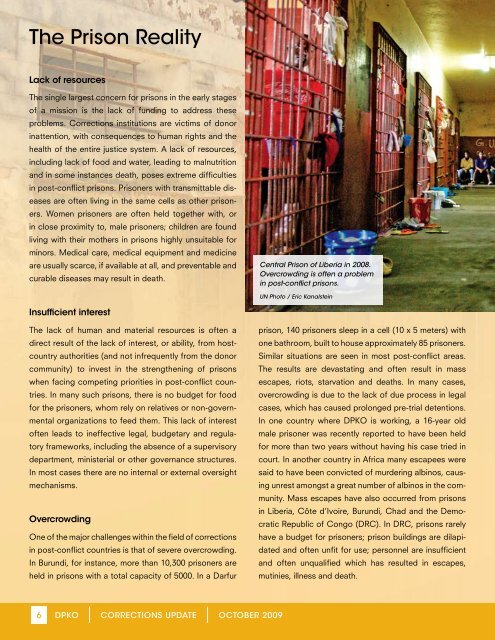the United Nations
the United Nations
the United Nations
- No tags were found...
You also want an ePaper? Increase the reach of your titles
YUMPU automatically turns print PDFs into web optimized ePapers that Google loves.
The Prison RealityLack of resourcesThe single largest concern for prisons in <strong>the</strong> early stagesof a mission is <strong>the</strong> lack of funding to address <strong>the</strong>seproblems. Corrections institutions are victims of donorinattention, with consequences to human rights and <strong>the</strong>health of <strong>the</strong> entire justice system. A lack of resources,including lack of food and water, leading to malnutritionand in some instances death, poses extreme difficultiesin post-conflict prisons. Prisoners with transmittable diseasesare often living in <strong>the</strong> same cells as o<strong>the</strong>r prisoners.Women prisoners are often held toge<strong>the</strong>r with, orin close proximity to, male prisoners; children are foundliving with <strong>the</strong>ir mo<strong>the</strong>rs in prisons highly unsuitable forminors. Medical care, medical equipment and medicineare usually scarce, if available at all, and preventable andcurable diseases may result in death.Central Prison of Liberia in 2008.Overcrowding is often a problemin post-conflict prisons.UN Photo / Eric KanalsteinInsufficient interestThe lack of human and material resources is often adirect result of <strong>the</strong> lack of interest, or ability, from hostcountryauthorities (and not infrequently from <strong>the</strong> donorcommunity) to invest in <strong>the</strong> streng<strong>the</strong>ning of prisonswhen facing competing priorities in post-conflict countries.In many such prisons, <strong>the</strong>re is no budget for foodfor <strong>the</strong> prisoners, whom rely on relatives or non-governmentalorganizations to feed <strong>the</strong>m. This lack of interestoften leads to ineffective legal, budgetary and regulatoryframeworks, including <strong>the</strong> absence of a supervisorydepartment, ministerial or o<strong>the</strong>r governance structures.In most cases <strong>the</strong>re are no internal or external oversightmechanisms.OvercrowdingOne of <strong>the</strong> major challenges within <strong>the</strong> field of correctionsin post-conflict countries is that of severe overcrowding.In Burundi, for instance, more than 10,300 prisoners areheld in prisons with a total capacity of 5000. In a Darfurprison, 140 prisoners sleep in a cell (10 x 5 meters) withone bathroom, built to house approximately 85 prisoners.Similar situations are seen in most post-conflict areas.The results are devastating and often result in massescapes, riots, starvation and deaths. In many cases,overcrowding is due to <strong>the</strong> lack of due process in legalcases, which has caused prolonged pre-trial detentions.In one country where DPKO is working, a 16-year oldmale prisoner was recently reported to have been heldfor more than two years without having his case tried incourt. In ano<strong>the</strong>r country in Africa many escapees weresaid to have been convicted of murdering albinos, causingunrest amongst a great number of albinos in <strong>the</strong> community.Mass escapes have also occurred from prisonsin Liberia, Côte d’Ivoire, Burundi, Chad and <strong>the</strong> DemocraticRepublic of Congo (DRC). In DRC, prisons rarelyhave a budget for prisoners; prison buildings are dilapidatedand often unfit for use; personnel are insufficientand often unqualified which has resulted in escapes,mutinies, illness and death.6DPKO | CORRECTIONS UPDATE | OCTOBER 2009

















